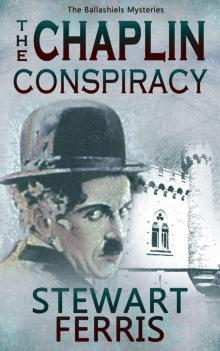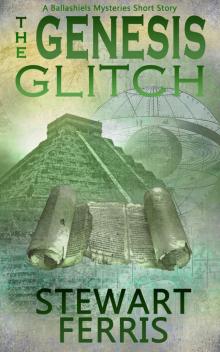- Home
- Stewart Ferris
The Dali Diaries (The Ballashiels Mysteries Book 2) Page 16
The Dali Diaries (The Ballashiels Mysteries Book 2) Read online
Page 16
Ratty grabbed it and held it close to his face. This was the photo he had dreamed of finding. He checked the date on the back. 1975. The colour picture showed Dalí and his mother standing arm in arm on a beach that appeared to be Port Lligat, just outside Dalí’s house. He thought of all the police and inhabitants of Stiperstones village who had searched the hedgerows and fields after his mother’s disappearance. A five mile radius around Stiperstones Manor had been examined with a fine toothcomb. Key spots in the wider county had also been searched. Hundreds had been interviewed. No one had thought it necessary to knock on the door of an elderly painter living a thousand miles away. No one had found any hint of a trail leading to Spain.
The photo made Ratty well up. To his enormous embarrassment, he sensed a tear beginning to leak onto his face. Emotions were breaking out of the secure part of his brain where they were normally locked away, and now their force was something to which he could offer no resistance. The single tear was followed by a full scale blubbing and a brief wailing. The old man and the Patient sat uncomfortably while Ratty tried to regain some composure.
‘Frightfully sorry,’ he managed to say between sobs. ‘Takes me back to a somewhat rum part of my life.’
‘May I take it that you knew about Lady Ballashiel’s visit to Dalí’s house in 1975?’ asked the Patient, doing his best to move things forward during Ratty’s temporary incapacity.
‘Knew about it?’ asked the old man. ‘Of course I knew about it. I instigated it.’
‘So why didn’t she come home?’ asked Ratty in a broken, high-pitched voice that made him sound like a lost child.
‘Life is far more complex than you realise,’ said the old man. ‘Fate throws curved balls. Shit happens. You can’t always get what you want.’
‘Are you in a position to advise Lord Ballashiels as to the fate of his mother after this photograph was taken?’ asked the Patient.
The old man shook his head. Ratty pulled himself together.
‘Goodness me, what a performance,’ said Ratty. ‘What must you think of me?’
‘I think you are foolish to come here,’ the old man replied.
‘I say – you’ve just admitted to being the reason for Mother’s visit to Dalí, and now you insult me for wanting to know what became of her.’
‘I think you should leave immediately,’ the old man said, emotionlessly. ‘There is nothing for you to learn here. Only bad can come of your involvement in our affairs.’
‘I must say, your attitude seems a little harsh, old fellow.’
‘I am giving you a lifeline that you are fortunate to be able to exploit. You will have the chance to return home where you will spend the rest of your days at Stiperstones.’
‘Bit of a rotten opportunity if you ask me. Look, I’m frightfully sorry for the breakin and wotnot. Obviously you’re a tad miffed but I’ll happily pay for any damages. Do you want proper money or do you prefer those funny little Euros?’
‘There is no need for money to change hands, Your Lordship. Enjoy whatever money you have while you still have a life with which to enjoy it.’
‘To the uninitiated, your words have a tendency to sound as if they are loaded with threats,’ observed the Patient.
‘Not threats,’ replied the old man. ‘Advice. His Lordship is fortunate to have lived any life at all, and I am advising him to enjoy whatever may be left of it.’
‘Still sounds like something of an undercurrent to me,’ said Ratty. ‘It’s the sort of advice one might give to someone whose days are numbered. And not a particularly big number, to boot.’
‘All our days are numbered,’ said the old man. ‘We must simply do our best for the planet with the days that we have. I can’t let you obstruct what I am doing to improve the world, which is why I can’t let you remain here. Your village police constable will escort you both home where I expect you to remain out of trouble. Otherwise your safety cannot be guaranteed and the number of days you have left may be seriously curtailed.’
‘Well now, this has gone far enough,’ blurted Ratty, thoroughly miffed at the attitude of the old man and the hindrances placed in his way when all he wanted to do was to find out what happened to his mother. ‘We mean no ill to anyone, and we are on an honest quest for information about a missing woman. Your attitude is not only unhelpful, it’s positively beastly.’
There was a knock at the door. Constable Stuart let himself in and whispered something into the old man’s ear.
‘What? Why would he do that?’ asked the old man.
‘No one knows, but this time he was caught in the act. The police are holding him in the cells right now.’
‘But Florida? How could he have got there? My men are watching him in New York.’
‘All I know is that he was caught stealing a painting from the Dalí museum in St. Petersburg, Florida.’
‘Which painting?’
‘I believe it is called something like Daddy Longlegs of the Evening.’
‘That’s a small one. I wouldn’t have thought he would struggle with that. But anyway, he can’t be in Florida because I know he’s started digging at Flushing Meadows. My men in New York confirmed this just minutes ago.’
‘If I may interject,’ said the Patient.
‘You may not,’ replied the old man. ‘This is not your business.’
‘Nevertheless, you appear to have hit a philosophical conundrum that is solvable only by making a sideways step,’ the Patient continued.
‘Go on, young man,’ said the policeman before the old man could contradict him.
‘You appear to be of the opinion that someone you are observing in New York has attempted to steal a work of art in Florida at the same time. Therefore you must step sideways and entertain the possibility that they are not the same person.’
‘But the man in Florida has confessed to the New York and London art thefts,’ said Stuart. ‘That means it’s the same man we sent to Flushing Meadows.’
‘How can you be sure that the man you sent to Flushing Meadows is guilty of those previous thefts?’ asked the Patient.
The old man held up his hand to cease the conversation. He appeared to be deep in thought. ‘I may have sent to Flushing Meadows someone who is not a professional art thief? An interesting situation. A loose cannon, working hard, getting the job done, even though he isn’t who I thought he was. Very interesting indeed.’
‘If he’s not who you think he is,’ said Stuart, you don’t have any hold over him. His only crime was skipping the queue at the museum. If you can’t threaten him with the consequences of those art thefts you have no control at all.’
‘Do you really think my preparations would be so sparse as to rely on the efforts of one man? Of course not. I don’t need him. If he delivers, fine. If not, I have other people to put in his place.’
‘We could send someone else to watch over him,’ said the constable. ‘Just to be safe. And I think I have just the person in mind.’
‘We could observe this character on your behalf,’ said the Patient.
‘Could we?’ asked Ratty.
‘A ridiculous idea,’ said the old man. ‘I happen to have someone far more suited to the task. Constable Stuart will escort you both home.’
‘Is that wise, sir?’ asked Stuart.
‘Explain your thinking.’
‘We have them both here. There isn’t long to go, now. Perhaps it would be better for them to remain here under our watch, than to give them any kind of freedom.’
‘Very well. Soon their presence will cease to matter anyway.’
‘Have you enquired as to his friend’s parentage?’ asked the constable.
‘What is your name?’ asked the old man.
‘The Patient,’ replied the Patient.
The old man looked at him quizzically, but did not pursue the matter of the odd name.
‘And when were your parents born?’
‘That is a subject that is best avoided.’
‘Were they post-war b
aby boomers?’
‘In what sense?’
‘Did the end of the war influence the date of your conception in some way?’
‘I think it’s fair to say the war was a relevant factor, yes.’
Ratty regarded the Patient carefully, sensing that the line of questions was creeping close to subject areas that were disagreeable for his friend. The Patient was normally unflappable, but it was hard to be reminded of his family’s connection to the worst atrocities of the Second World War.
‘Good. In that case we have nothing to fear from either of you. You have both been very fortunate to have been born. I will keep you within arm’s reach for your remaining days on this planet. I trust you will make the most of the time you have left.’
***
Rocco was convinced he was being followed. He spent much of his life under such an apprehension, but today it felt more real than ever. Since his meeting at the Dalí museum he had remained in central Figueres, waiting for the call that would confirm whether or not the old man had found a use for him. He had wandered through the shopping areas, he had stopped for coffee in more than one café, but since he began strolling aimlessly through picturesque ancient streets in the medieval quarter he sensed a set of footsteps had been mirroring his own for too long. Without looking back he darted down a side road off a central square and into the open vestibule of an apartment building.
A smartly dressed man stepped into the vestibule and stopped before him. He had a shaved head with patches of grey stubble, and a portly frame that squeezed out two chins where there should have been only one.
‘Please don’t be alarmed,’ said the man.
‘Bit late for that,’ replied Rocco.
‘Allow me to introduce myself. My name is Grant. I was sent by my boss to request your company at the museum at your earliest convenience.’
‘Your boss?’ asked Rocco.
‘The Director at the museum.’
‘Ah, that old man. Doesn’t he have a telephone?’
‘He likes to work on a personal level, where possible,’ replied Grant.
‘What are you, some kind of butler?’ Rocco looked at the man’s inappropriately stuffy suit and tie, and wondered how his leather shoes could retain such a dazzling shine amid these dusty Spanish sidewalks.
‘I have been employed as such earlier in my career,’ replied Grant. ‘I work in a more varied role these days.’
‘So, the old man wants to see me?’ asked Rocco.
‘Now.’
This was the news he had been waiting for. He was about to enter the conspiracy. The Keo mystery would be solved.
Down in her trench, scraping the soil a millimetre at a time, Ruby felt at peace. She wanted nothing to do with Rocco and his desire to involve himself in a bizarre and incomprehensible conspiracy. The dig at Empúries was progressing well. Soon after the imperfect extraction of the statue of the goddess Artemis, fragments of another marble deity had been located, and the search was on to find enough sections to be able to identify it. Always in the back of her mind was the possibility that she might discover more evidence that tendrils of culture had crossed the Atlantic in ancient times, linking Europe and the Middle East with Central America, sharing the technologies and ideas that were destined to become lost for so many millennia.
When a shadow fell across her, she knew better than to look up. She continued scraping, and merely whispered,
‘What do you want?’
‘I have news,’ said Rocco.
‘Not so close. You’ll collapse the sides of the trench,’ said Ruby.
Rocco ignored her lack of enthusiasm for his presence and jumped into the trench next to her.
‘Careful, Rocco! There are priceless artefacts just beneath the soil.’
‘Ruby, have you been wondering what happened to your friend Charlie?’ asked Rocco.
‘He’s not my friend. He’s my stalker.’
‘Well he’s not stalking you now. The old man from the museum has sent him to New York to do something that I’m not allowed to know yet. But he wants me to go to New York this evening and oversee whatever it is that Charlie’s doing out there.’
‘So you’re not going to be getting up my nose anymore?’
‘I came to say goodbye.’
Ruby’s mood lightened visibly. She looked up from her scraping and smiled.
‘That’s wonderful news.’
‘You sure you’ll be able to cope without me?’
Ruby glared at him. Rocco climbed out of the trench.
‘Wait,’ she said, standing up. ‘Do you think Charlie’s going to be OK?’
‘What do you mean?’
‘Charlie’s not the sort to work for anyone. He has no ideals, no work ethic. Why would he give up his tour of Europe for a job he doesn’t need?’
‘You’re worried about him, aren’t you, Ruby?’
‘No. Of course not. It’s just, he’s, well, I just wouldn’t want any harm to come to him. I know he’s a bit obsessive about me, but his heart is in the right place.’
‘I understand,’ said Rocco. ‘I’ll try to take care of him over there.’
‘I just don’t get why he would do this in the first place. First the old man at the museum tries to kill you. Then he recruits Charlie. Then he recruits you too. It doesn’t add up.’
‘You know as much as I do,’ replied Rocco. ‘Charlie and I seem to be working for something or someone that is hiding behind the shadows. Eventually they’ll tell me. He promised me information if I do what they want.’
‘Have you tried just asking that old man what he’s up to directly?’ Ruby asked.
‘Of course. He’s not going to give me all the facts off the cuff. Look, I have to catch a taxi to the airport. I’m being flown out to New York tonight. He’s bought me a first class ticket. Movies and a massage all in the same seat, several cocktails, a good sleep and I wake up in America. Investigating conspiracies has never been so much fun. It’s been good knowing you, Ruby.’
She looked away, deep in thought. Rocco could barely take care of himself, let alone Charlie. They had no idea what they were getting themselves involved in. No sane person accepted people off the street and sent them first class across the world to do important work. She wanted answers. She needed to know what risks Charlie was really facing. She resolved to face the old man one more time. The idea of going back into that building and confronting him in his office gave her butterflies in her stomach, but the rational side of her soothed that feeling. After all, she had dealt with museum officials all over the world. They could be cantankerous, moody, intimidating and secretive, but they were never dangerous. The old man wouldn’t harm her. As soon as she finished her section of dig today, she was going back to Figueres.
***
Ratty and the Patient found themselves once again in the attic storey of the building, locked in a secure room used for the storage of works of art when they were not on display. The room had been cleared of valuables before their incarceration, but some of the paraphernalia of a busy museum remained behind: steel frames on trolley wheels for moving artworks around; specialist cleaning equipment; piles of dust sheets.
‘How are you enjoying your first visit to Spain?’ asked Ratty, making small talk to mask the guilt he felt at having instigated the journey that had led to their imprisonment.
‘I find the local people most accommodating,’ replied the Patient.
‘I don’t know what to do now. Can’t go home. Don’t want to give in to whatever this old fellow wants. And yet I don’t know how I can further my research in this area now that they’ve locked us up.’
‘Perhaps you are forgetting one thing, my friend?’
‘Is it something to do with philosophy?’ Ratty sighed.
‘It is my ability to fabricate a key from sight. It may require several visits from our captors, but I am confident that I can fashion a functional device from the items we have around us.’
‘I do hope so, oth
erwise we could spend the rest of our days here, unknown to the world, soon forgotten by all. Rather like Mother, in fact. Oh my goodness, that’s it, Patient chappy! The potty old fellow must have treated her the same way he has treated us.’
‘You think he locked her away back in 1975?’
‘It’s possible. He does seem rather keen on the habit.’
‘What could his motive have been?’ asked the patient. ‘It wasn’t blackmail or kidnap. It wasn’t terrorism. She had committed no crime against him. Illegal imprisonment is not something a man undertakes lightly. I have had enough experience of that myself to know that there is always a powerful reasoning behind it, however twisted or evil that reason may be.’
‘Mother was a baby boomer, I believe. He does seem to have a bit of a thingy about them. Perhaps his goal in life is to round them all up?’
‘Unlikely. Why maintain a front as the curator of an art museum? There has to be a connection between Dalí and his unfathomable motives.’
‘I wonder if there is any evidence that Mother was once held in this building? What do you think, Patient chappy?’
‘Dalí restored this building in the early Seventies and it opened in 1974. Therefore the arrival of your mother a year later makes it conceivable that she was held within these walls.’
‘Golly. Make that key, Patient fellow. I sense a nocturnal maternal hunt coming on.’
‘Have you considered, my friend, the possibility that we may not only be looking for traces of past incarceration, but of the present also?’
‘Are you trying to say she could still be here?’
‘It is mathematically possible. She arrived as a relatively young woman. Statistically speaking, the chances of her still being alive, with appropriate exceptions for accident and murder, of course, are quite high.’
Ratty appeared to wobble. In his mind, she had been dead since the memorial service and the legal documents that had made it so official in his early teens. He had considered this journey mainly as an investigation into the mysterious circumstances of her death. The possibility that she might actually be alive had always seemed beyond probability, but once he allowed a chink of hope to shine into his mind, he was drawn inexorably towards it.

 The Chaplin Conspiracy
The Chaplin Conspiracy The Sphinx Scrolls
The Sphinx Scrolls The Little Book of Flirting
The Little Book of Flirting The Genesis Glitch
The Genesis Glitch The Dali Diaries (The Ballashiels Mysteries Book 2)
The Dali Diaries (The Ballashiels Mysteries Book 2)